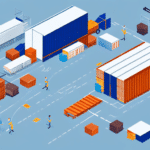Unlocking the Benefits of 3PL (Third-Party Logistics)
Are you looking for ways to streamline your business operations, cut costs, and enhance your supply chain management? One solution that could help you achieve all of these goals is using third-party logistics (3PL) services. In this comprehensive article, we'll explore what 3PL is, the benefits of outsourcing logistics to a third-party provider, and best practices for working with a 3PL provider effectively. We'll also address some common misconceptions about 3PL and examine future trends in the industry.
What is 3PL and How Does it Work?
Third-Party Logistics (3PL) refers to the outsourcing of logistics, transportation, and distribution services to an external provider. This includes functions such as warehousing, inventory management, order fulfillment, and transportation. By delegating these tasks, businesses can focus on their core competencies. 3PL providers vary in size and scope, with some specializing in specific areas, while others offer comprehensive, full-service solutions.
The relationship between a business and a 3PL provider is typically governed by a contract, outlining the services to be provided, the duration, and Service Level Agreements (SLAs). SLAs define performance metrics like on-time delivery rates and inventory accuracy levels. In return for their services, 3PL providers charge fees, which can be structured in various ways, such as per shipment or per unit of inventory.
One significant benefit of using a 3PL provider is the ability to scale operations quickly. As a business grows, it may lack the resources or infrastructure to handle increased demand. A 3PL provider can ramp up operations to meet business needs without requiring substantial capital investment. Additionally, 3PL providers often have established relationships with carriers and other logistics partners, resulting in cost savings for the business.
However, there are potential drawbacks to using a 3PL provider. Businesses may have less control over the logistics process and may lack visibility into the status of their shipments or inventory. If the 3PL provider encounters issues or delays, it can negatively impact the business's reputation. Therefore, it's crucial for businesses to carefully evaluate their needs and the capabilities of potential 3PL providers before entering into a contract.
Why Use 3PL Services for Your Business?
The primary reason businesses use 3PL services is to reduce costs and improve efficiency. 3PL providers benefit from economies of scale, allowing them to negotiate better rates for transportation, warehousing, and other services than individual businesses can achieve on their own. This translates to lower costs for companies utilizing these services. Additionally, outsourcing logistics allows businesses to allocate resources and personnel to focus on their core competencies and growth strategies.
Another advantage is the expertise and specialized knowledge that 3PL providers bring. These providers are experts in logistics and supply chain management, offering insights that can lead to improved efficiency in areas like inventory management and order fulfillment. According to a Forbes report, companies that partner with 3PL providers can see up to a 30% improvement in supply chain efficiency.
Advantages of Outsourcing Logistics to a Third-Party Provider
Outsourcing logistics to a third-party provider offers numerous advantages, including:
- Cost Savings: 3PL providers can negotiate better rates for transportation, warehousing, and other services, resulting in lower costs for your business.
- Improved Efficiency: By outsourcing logistics, businesses can free up resources and personnel to focus on core activities and growth strategies.
- Access to Specialized Knowledge: 3PL providers are experts in logistics and supply chain management, enhancing efficiency in inventory management and order fulfillment.
- Scalability: 3PL providers can adjust their services to meet changing client needs, whether scaling up to handle increased demand or scaling down during slower periods.
- Reduced Risk: 3PL providers assume some of the risks associated with logistics, such as lost or damaged inventory, thereby mitigating risk for the client.
Cost Savings with 3PL: How it Works and Why it Matters
One of the key benefits of using 3PL services is cost savings. By leveraging the economies of scale that 3PL providers offer, businesses can negotiate better rates for transportation, warehousing, and other services than they could independently. According to a 2023 study published in the Journal of Supply Chain Management, companies partnering with 3PL providers have reduced their logistics costs by an average of 15-25%.
Additionally, outsourcing logistics allows businesses to reallocate resources and personnel that would otherwise be dedicated to managing the supply chain. This can lead to lower personnel costs and a reduced need for investment in equipment and facilities.
Furthermore, 3PL providers can help businesses save on capital expenditures. For instance, a 3PL provider may possess its own warehousing facilities, eliminating the need for businesses to invest in real estate. Similarly, 3PL providers often have their own transportation assets, such as trucks and trailers, which means businesses do not have to purchase or maintain these assets themselves.
Improved Efficiency with Third-Party Logistics
Another significant benefit of using 3PL services is improved efficiency. 3PL providers bring expertise in logistics and supply chain management, allowing them to implement best practices that enhance operational efficiency. For example, a 3PL provider may utilize technology tools that enable real-time tracking and reporting of inventory levels, helping businesses optimize their inventory management. Additionally, advanced order fulfillment systems used by 3PL providers can improve the speed and accuracy of picking and packing orders.
Data from the Logistics Management Association indicates that companies using 3PL services report a 20% improvement in order accuracy and a 30% reduction in delivery times.
Enhanced Supply Chain Management with 3PL Services
3PL providers play a crucial role in enhancing supply chain management for businesses. By outsourcing logistics, businesses gain access to the expertise and resources of the 3PL provider, leading to improved visibility into the supply chain, better inventory management, and more accurate demand forecasting. Additionally, 3PL providers assist in risk management by offering insurance against lost or damaged inventory and implementing disaster recovery plans to mitigate supply chain disruptions.
According to a report by McKinsey & Company, businesses that partner with 3PL providers experience a 25% improvement in supply chain visibility and a 15% increase in inventory turnover rates.
The Role of Technology in Third-Party Logistics
Technology is integral to the effectiveness of third-party logistics. 3PL providers typically use advanced software systems to manage inventory, orders, and transportation. Technologies such as GPS tracking and real-time data analytics optimize transportation routes and improve delivery times. By leveraging technology, 3PL providers offer clients enhanced visibility into the supply chain, more accurate demand forecasting, and overall improved efficiency.
Modern 3PL providers are increasingly adopting technologies like Artificial Intelligence (AI) and Internet of Things (IoT) to further streamline operations. For example, AI-driven predictive analytics can forecast demand more accurately, while IoT devices can monitor the condition of goods in transit in real-time.
Risk Management in Logistics: How 3PL Can Help
Logistics inherently involves risks such as lost or damaged inventory, supply chain disruptions, and transportation delays. 3PL providers help businesses manage these risks through various measures. They may offer insurance against lost or damaged inventory and implement disaster recovery plans to address supply chain disruptions. Additionally, 3PL providers provide real-time monitoring and reporting of inventory levels, facilitating more accurate demand forecasting and effective supply chain management.
A 2023 survey by Supply Chain Digital found that 78% of businesses using 3PL services reported better risk management and reduced instances of supply chain disruptions.
Common Misconceptions About 3PL Debunked
There are several misconceptions about 3PL that can be clarified with a better understanding of the industry:
- Only Large Businesses Benefit: Contrary to popular belief, 3PL providers offer valuable services to businesses of all sizes. Smaller businesses can leverage the economies of scale and expertise that 3PL providers offer, which might otherwise be inaccessible.
- Outsourcing Equals Loss of Control: While outsourcing logistics might seem like relinquishing control over the supply chain, businesses can maintain significant control by establishing clear Service Level Agreements (SLAs) and closely monitoring performance metrics.
- 3PL Providers Are One-Size-Fits-All: In reality, 3PL providers offer a range of services tailored to specific business needs, allowing for customized logistics solutions rather than generic, one-size-fits-all approaches.
How to Choose the Right 3PL Provider for Your Business
Selecting the right 3PL provider is a critical decision that requires careful evaluation of several factors:
- Experience and Expertise: Consider the provider's experience in your industry and their expertise in specific logistics functions relevant to your business.
- Range and Quality of Services: Assess the range of services offered and ensure they align with your business needs. Quality of service is paramount, so look for providers with a proven track record.
- Performance Track Record: Review the provider’s performance history, including reliability, on-time delivery rates, and customer satisfaction.
- Culture and Values: Ensure that the provider’s company culture and values align with your own, fostering a collaborative and productive partnership.
- Technology Infrastructure: Evaluate the provider’s technology systems and their ability to integrate with your own, enabling seamless data exchange and real-time visibility.
Refer to industry reviews and seek referrals to gain insights into the provider’s reputation and service quality.
Case Studies: Success Stories of Companies Using 3PL Services
Many companies have successfully leveraged 3PL services to enhance their logistics operations:
- A clothing retailer reduced its inventory costs by 20% by outsourcing logistics to a 3PL provider, allowing it to invest more in product development and marketing.
- A technology company improved its on-time delivery rates from 85% to 99% by partnering with a 3PL provider that utilized advanced transportation management systems.
- An e-commerce business expanded its market reach internationally without significant capital investment by using a 3PL provider with global distribution capabilities.
Future Trends in Third-Party Logistics and What They Mean for Your Business
The future of 3PL is expected to be influenced by several key trends:
- Increased Use of Technology: Adoption of AI, machine learning, and IoT will continue to enhance logistics operations, providing greater efficiency and predictive capabilities.
- Emphasis on Sustainability: There will be a greater focus on sustainable logistics practices, including eco-friendly transportation methods and sustainable packaging solutions.
- Growth in E-commerce: The expanding e-commerce sector will drive demand for more sophisticated and scalable logistics solutions to handle increased order volumes.
- Enhanced Data Analytics: Advanced data analytics will provide deeper insights into supply chain performance, enabling more informed decision-making.
These trends will require businesses to seek 3PL providers that are adaptable and forward-thinking, ensuring their supply chains remain competitive and resilient.
Integrating Sustainability into Your Supply Chain with 3PL Services
Sustainability is becoming increasingly important in the logistics industry, and 3PL providers can play a pivotal role in helping businesses integrate sustainable practices into their supply chains. This can include:
- Sustainable Transportation: Using fuel-efficient vehicles, optimizing routes to reduce emissions, and investing in electric or hybrid transportation options.
- Sustainable Packaging: Adopting eco-friendly packaging materials and reducing packaging waste through innovative design and recycling programs.
- Energy-Efficient Warehousing: Implementing energy-saving technologies and practices within warehousing operations to minimize energy consumption.
- Waste Reduction: Implementing strategies to reduce waste in the supply chain, such as recycling programs and minimizing excess inventory.
Partnering with a 3PL provider that prioritizes sustainability not only helps reduce your environmental footprint but can also lead to cost savings and improved brand reputation. According to a GreenBiz study, businesses that integrate sustainability into their logistics operations can achieve up to a 10% reduction in overall logistics costs.
Best Practices for Working with a Third-Party Logistics Provider
To maximize the benefits of your relationship with a 3PL provider, consider the following best practices:
- Establish Clear Expectations: Define your requirements and objectives clearly in the contract and ensure both parties understand the expectations.
- Set Service Level Agreements (SLAs): Develop detailed SLAs that outline performance metrics, such as delivery times, accuracy rates, and response times.
- Monitor Performance Metrics: Regularly track and evaluate the provider’s performance against the agreed-upon metrics to ensure standards are being met.
- Maintain Open Communication: Foster regular communication with your 3PL provider to address issues promptly, share feedback, and collaborate on improvements.
- Integrate Technology Systems: Ensure that your technology systems are compatible with the 3PL provider’s systems to facilitate seamless data exchange and real-time tracking.
By following these best practices, businesses can build a strong, collaborative partnership with their 3PL provider, leading to significant cost savings, efficiency gains, and enhanced supply chain management.
Conclusion
As demonstrated in this article, utilizing third-party logistics (3PL) services offers numerous benefits, including cost savings, improved efficiency, enhanced supply chain management, and effective risk management. By selecting the right 3PL provider and fostering a collaborative partnership, businesses can achieve substantial efficiencies and cost reductions while also enhancing the sustainability and social responsibility of their supply chains. As the logistics industry continues to evolve with advancements in technology and shifting market demands, businesses that leverage 3PL services are well-positioned to stay competitive and drive continued growth and success.






















